How We Can Transform America’s Broken Economic System to Work for EVERYONE
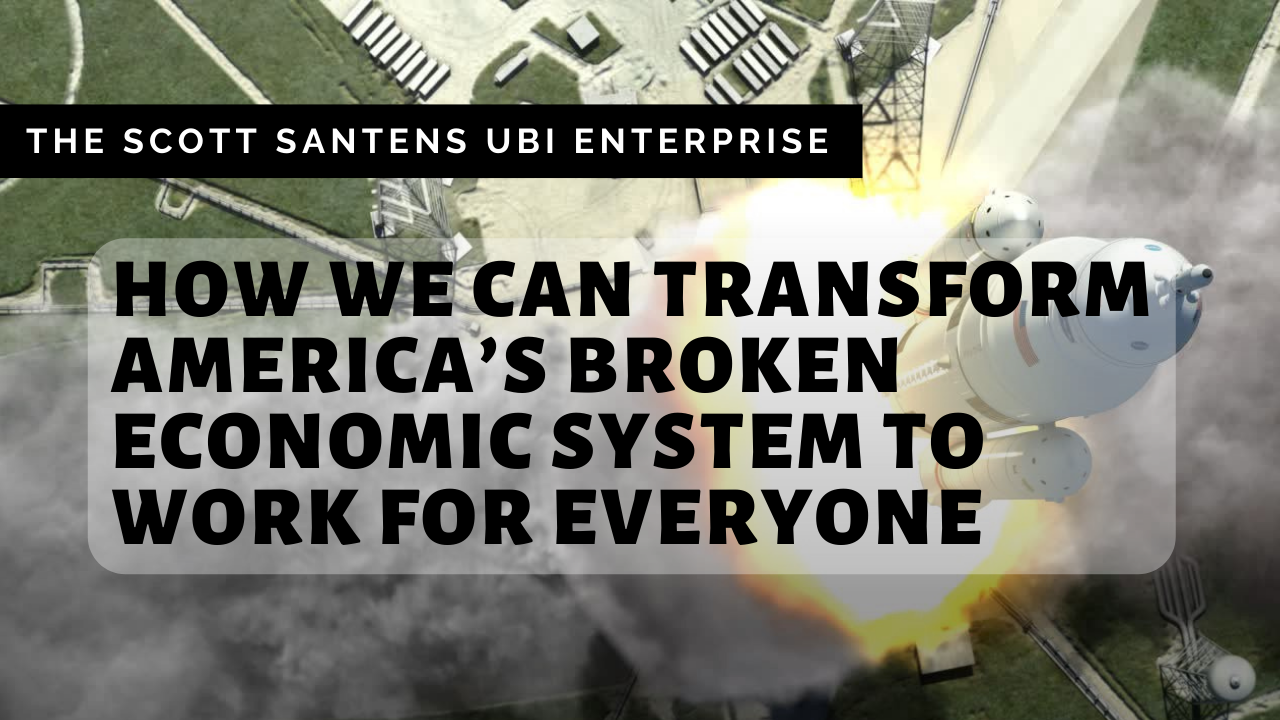
No matter how poor or rich, ALL of our lives can be better in the 21st century… if we unbreak the system
Japan arose like a phoenix from the ruins of World War II to quickly become the second most powerful economy in the world. This unbelievable feat has been called an “economic miracle.”
Do you know how they did it?
The answer to this question may surprise you. It involves a single American name and a single visualization. The name is W. Edwards Deming. The image is this flowchart:
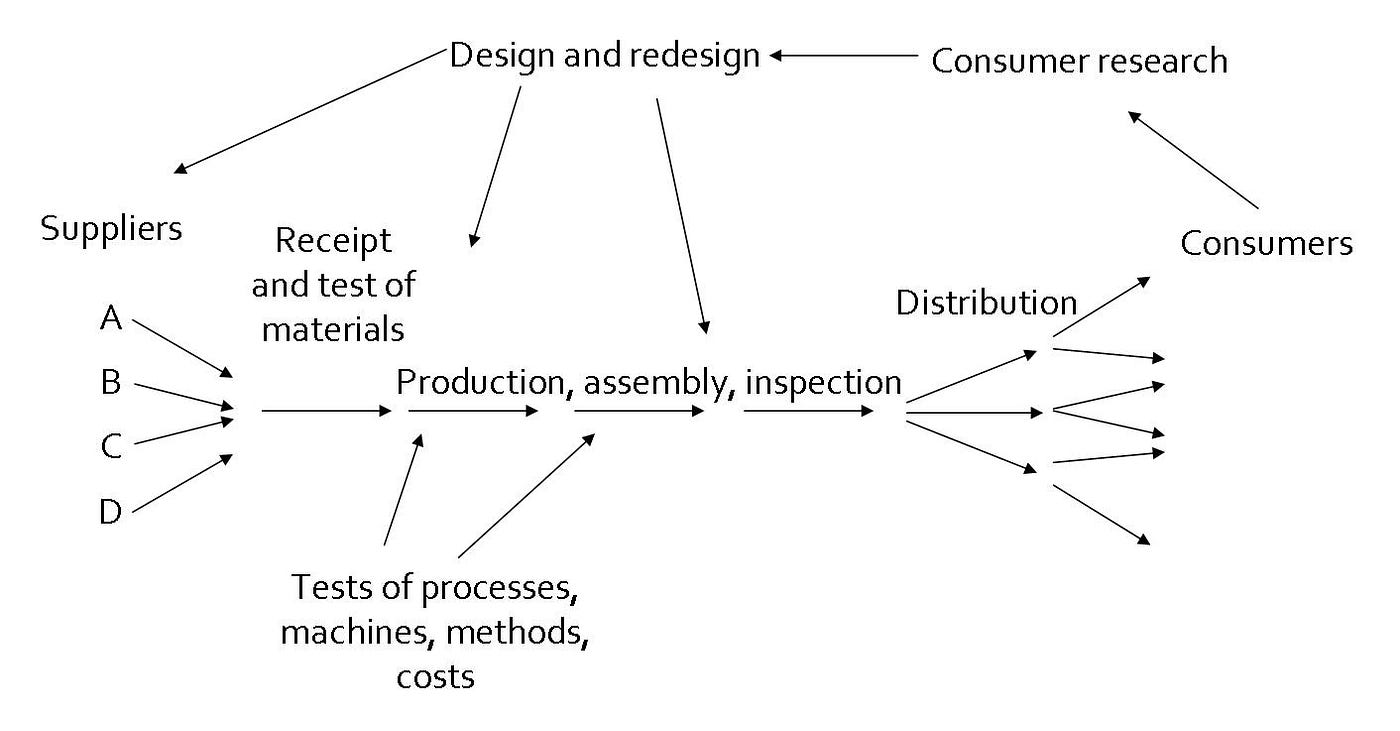
The Lessons of W. Edwards Deming
In The New Economics, Deming describes how this chart was on the blackboard of every conference with top management in Japan in 1950 and onward, and was seen by 80% of all owners of capital. It was used to teach their engineers. It was used to inform every part of the system of their roles in it.
Deming Lesson #1: Systems
Can you see how this one simple flowchart could be so miraculously transformative?
It’s a circle.
More than that, it’s an interconnected feedback loop designed for continual improvement. The aim of the entire production cycle is always increasing quality. Never stop improving. Never stop innovating. Never stop learning. Never stagnate. Never accept the status quo. Always do better.
It begins and ends with ideas. Without ideas, there can be no improvements.
It begins and ends with suppliers. Without raw materials, there can be nothing produced.
It begins and ends with production. Without production, there can be nothing to distribute.
And most important of all, it begins and ends with consumers.
“The consumer is the most important part of the production line. Quality should be aimed at the needs of the consumer, present and future.” — W. Edwards Deming, Out of the Crisis
Without consumers, there can be no system. Without listening to the consumer, there can be no improvements. Without being able to hear the consumer through their dollars, a system is destroyed. A system where consumers don’t exist or have no ability to consume, is truly pointless.
As a whole, production seen as a cycle reveals interdependence. Every part of the loop is a part of the system, and every part works together with every other part for the benefit of the entire system that never stops improving.
How exactly did Deming define a system?
A system is a network of interdependent components that work together to try to accomplish the aim of the system.
A system must have an aim. Without an aim, there is no system. The aim of the system must be clear to everyone in the system. The aim must include plans for the future.
A system must be managed. It will not manage itself. Left to themselves, components become selfish, competitive, independent profit centers, and thus destroy the system. — W. Edwards Deming, The New Economics
The year is 2015. Our markets are globalized. Our technology is advancing exponentially. Our production is increasingly automated. We have come a long way, but is our economy managed like a system? Is our government? Are we working together? What is our aim? Do we even have one? What is our plan for the future?
Are we even asking these questions?
Deming Lesson #2: Variation

Deming considered knowledge of variation key to management of systems, and so in possibly the most important demonstration ever devised, he taught his students the unavoidable reality of random variation.
In his seminars, he would bring boxes of colored beads and a paddle. For every 400 white beads, there were 100 red beads, and people would be given the job of using the paddle to capture the beads 50 at a time. All results were recorded. The goal with each swipe of paddle through beads, was to get as few red beads as possible. This was known as the “Red Bead Experiment.”
Those who scooped up the most red beads were seen as doing a poor job. Those who scooped up the most white beads were seen as doing a good job. Too many red beads, and one would be punished. Mostly white beads, and one would be rewarded.
It should be clear that no matter what anyone did, there would always be red beads drawn, because red beads were part of the system. They would only randomly vary in quantity. Because red beads were built into the system, those taking part in the experiment were rewarded or punished based purely on natural random variation. No amount of reward or punishment would alter the 4:1 ratio of white beads to red beads. This ratio was set by Deming before the lesson even began. The rest was luck.
Without understanding systemic variation, aside from the futility of reward and punishment, we also make two common and extremely costly mistakes:
Mistake 1: To react to an outcome as if it came from a special cause, when actually it came from common causes of variation.
Mistake 2: To treat an outcome as if it came from common causes of variation, when actually it came from a special cause. [The New Economics]
Imagine firing one employee and handing a bonus to another, without knowing neither act will result in any difference. This is Mistake 1.
Imagine getting sick and thinking it’s the flu without realizing you just experienced food poisoning. This is Mistake 2.
Recognizing and avoiding these mistakes is vital to systemic improvement.
Deming Lesson #3: Knowledge
Nothing can be improved without knowledge. The existence of a hammer does nothing for a human being without understanding how to use it. Facts are just facts. Data is just data. Information is just information. It’s the questions behind our observations that create knowledge through theory. This is how the scientific method works. Noticing that an apple falls is just data. Wondering why it falls, is what leads to formulating the laws of gravity.
A system can not be improved without the application of knowledge through theory. If we learn something new, and don’t apply this new knowledge, our systems can’t change for the better.
To improve a system we must ask questions, develop theories, test the theories, and apply the theories. This is how systems may be continually improved — scientific thinking.
“At the heart of science is an essential balance between two seemingly contradictory attitudes — an openness to new ideas, no matter how bizarre or counterintuitive they may be, and the most ruthless skeptical scrutiny of all ideas, old and new. This is how deep truths are winnowed from deep nonsense.” — Carl Sagan
Deming Lesson #4: Psychology
We are human beings. To improve systems created by human beings, we must understand human beings. We must understand that within a system of human beings, there will always be variation — everyone is different — and that if we wish to improve our systems, we must study the human mind and apply the knowledge we gain to our systems to produce better outcomes.
The study of motivation is an important example of this. There is extrinsic and intrinsic motivation. The former involves being given something to do something, and the latter is when something is its own reward. We know how these work, but we don’t leverage this knowledge within our economy.
Example: Paying someone to do something can actually destroy motivation.
“This is one of the most robust findings in social science, and also one of the most ignored. I spent the last couple of years looking at the science of human motivation, particularly the dynamics of extrinsic motivators and intrinsic motivators. And I’m telling you, it’s not even close. If you look at the science, there is a mismatch between what science knows and what business does… That’s actually fine for many kinds of 20th century tasks. But for 21st century tasks, that mechanistic, reward-and-punishment approach doesn’t work, often doesn’t work, and often does harm.” — Dan Pink
Meanwhile, the relatively new study of neurogenesis provides a truly incredible example of the damage we are doing.
Example: Poverty and extreme inequality destroy minds
The structure of our brain, from the details of our dendrites to the density of our hippocampus, is incredibly influenced by our surroundings. Put a primate under stressful conditions, and its brain begins to starve. It stops creating new cells. The cells it already has retreat inwards. The mind is disfigured.
The social implications of this research are staggering. If boring environments, stressful noises, and the primate’s particular slot in the dominance hierarchy all shape the architecture of the brain — and Gould’s team has shown that they do — then the playing field isn’t level. Poverty and stress aren’t just an idea: they are an anatomy. Some brains never even have a chance.
If as humans, we are to improve our systems in the present and for the future, we must seek out these kinds of scientific findings and actually apply them.
These four primary lessons are what Deming referred to as a “System of Profound Knowledge.” This system provides a map for understanding human systems.
So now that we’ve got such a map, what do we do with it?
Applying the System of Profound Knowledge
Crime, poor health, racism, poverty, extreme inequality, unnecessary jobs, wasted productivity, depressed economic growth, environmental degradation, climate change — these are all red beads.
We can choose to attempt to reduce these red beads by spending trillions of dollars on imprisonment, on health care, on quantitative easing, on bureaucracy, on bailouts, on fighting epidemics, on battling floods, ad infinitum. Or we can choose to produce fewer red beads in the first place.
How do we produce fewer red beads?
Producing fewer red beads is the responsibility of all of us. It can’t be accomplished by any one part of the system in competition against each other. It won’t just happen on its own. It requires systemic transformation.
“I’m simply saying that more and more, we’ve got to begin to ask questions about the whole society. We are called upon to help the discouraged beggars in life’s market place. But one day we must come to see that an edifice which produces beggars needs restructuring.” — MLK, Where do we go from here?
“In order to produce better systems, a society should be less concerned with producing material goods in increasing quantities than with producing people of a better quality — in other words, (human) beings capable of producing these systems.” — Levi Strauss
If we wish to transform the U.S. to continually produce better outcomes, we must first understand its present state, and the outcomes the system is currently producing.
The State of the Union: 2015
- Whereas each generation used to be better off than the previous generation, that is no longer the case.
- Child poverty is the highest it’s been in 20 years.
- The U.S. is 1 of only 4 countries in the world where the maternal mortality rate is rising instead of falling.
- Sixty years ago, the U.S. had the 12th lowest infant mortality rate in the world. By 1990, we were 23rd. By 2008, we were 34th. We are now 49th.
- The 40-hour work week is gone, to the detriment of productivity. We work an average equivalent of 6 to 8 more weeks per year than a generation go, with worse results.
- The American middle class has not seen a raise in 15 years.
- Our middle class is 20% poorer than it was 30 years ago.
- Middle class families are increasingly spending more on basic needs while earning less.
- For the first time in over 50 years, the majority of our public school children are poor.
- Our poorest 20% would now be better off in 10 other countries.
- Over 40% of Americans are now living paycheck to paycheck, so savings are practically nonexistent amongst any but the richest.
- More than 1 in 3 Americans have debts and unpaid bills that have been reported to debt collectors.
- Hunger among seniors is up 81% since 2006.
- The gap between those who eat well and those who don’t has doubled in 10 years.
- Food banks are now helping more than 46 million Americans to eat, and are overstretched to the point that 1 in 6 is expected to fail.
- We are losing entrepreneurs. New business creation has gone from 13% to under 8% in the last 30 years.
These are systemic issues.

In the 21st century, full-time jobs are being replaced by part-time jobs. This is not any one President in action. This is a systemic shift greatly influenced by advancing technology and growing automation of labor. It just increasingly takes less work to accomplish what we want to accomplish.

The labor force participation rate peaked in 2000 and has been going nowhere but down ever since, despite continually rising productivity. Less human labor is needed now than ever before thanks to technology, and less American labor is possible thanks to globalization. Jobs are trending downward and have been for almost 20 years.
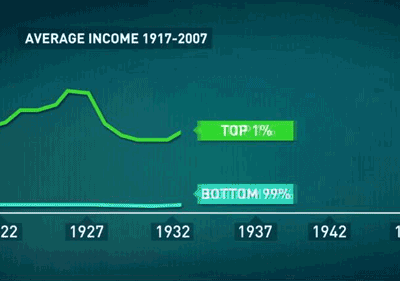
Meanwhile, U.S. income inequality has been skyrocketing for decades. Inequality is now the highest it’s been since 1928 — right before the Great Depression. The top 1% has again completely left behind the bottom 99% in a new Gilded Age.
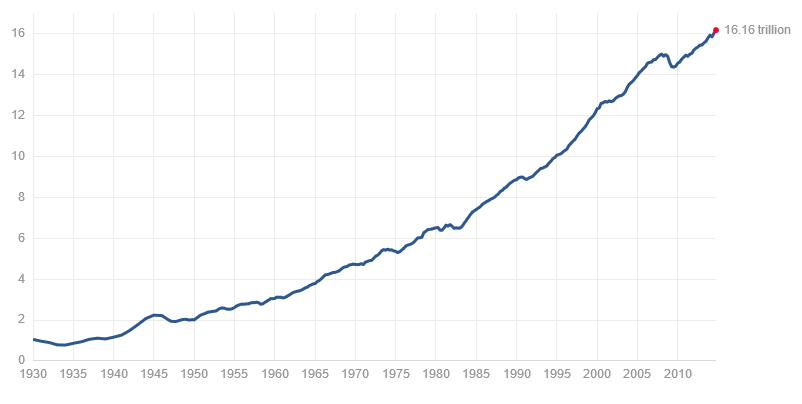
All of this and more in a time when our economy has more than doubled in size, and when a whopping 492 of the 1,645 billionaires in the world are American. In fact, if we totaled up the wealth of the top 400 Americans, it would exceed $2 trillion. This is equivalent to the total wealth of HALF of the entire United States.
What’s going on here?
What’s going on is exactly what happens when systems aren’t managed as systems. Parts of the system are destructively competing against each other instead of creatively working together for the good of the entire system.
One may be tempted to think that because GDP has more than doubled, this growth is evidence that the system is working. But is it really working if GDP could be even higher?
The Depressing Effects of Inequality

According to the OECD, thanks to inequality, all but three of these countries have lower GDP than they would otherwise have — even Denmark.
The U.S. economy may have grown by almost 30% in 20 years but it could have grown by over 30%. And that’s if we had just kept inequality the same as it was in 1985. Had we reduced our inequality, our economy could have grown by over 40% or even 50% or more since 1985.
“Policies that help to limit or reverse inequality may not only make societies less unfair, but also wealthier.” — OECD, 2014
So even if we’d just prevented inequality from growing, let alone exploding, our GDP would be higher. The rich would have more. The middle classes would have more. The poorest would have more. We would all be wealthier.
But decreasing inequality would also engage economic multipliers for even greater growth.
The Uplifting Effects of Economic Multipliers
It has been calculated that every $1 going to a low-wage worker adds $1.21 to GDP, whereas every $1 going to a high-income earner adds 39 cents. It’s three times more economically stimulating for a dollar to reach the hands of those with few dollars than those with many. And not only that but one shrinks the economy while the other expands it.
But what if that $1 went instead to a worker in a research field, like a scientist or an engineer? The economy would be $5 better off. That’s thirteen times more economically stimulating for a dollar to reach the hands of a researcher instead of a broker on Wall Street.

Policies like tax cuts and spending on infrastructure are thought by many to have the largest multiplier effects. They don’t. Instead, policies that put spending power into the hands of those with the least spending power, increases GDP most.
With all of this data available to us, one would think we’d be throwing every dollar we could at researchers, unemployment benefits, and food stamps. Instead our PhDs are being paid so little they have to increasingly rely on food stamps, which we are actually reducing, instead of increasing.
The Destruction of a System
That those on Wall Street are earning huge bonuses that actually reduce GDP while scientists who massively increase GDP are being given food stamps to survive — which we are then cutting despite that even further reducing GDP — is a perfect example of a system that is not functioning.
Does it make sense to lose 60 cents for every dollar, when we could just as easily gain 5 dollars for every dollar? Does it make sense to cut programs that grow the economy and instead depress the economy by increasing the concentration of wealth among those who consume less?
These policy decisions are holding all of us back, every single one of us. No matter how rich or how poor, these decisions are costing all of us, even the top 1% who will likely require being taxed more to unbreak the system.
How can being taxed more actually result in being better off?
The Billion Dollar Question
Imagine having a billion dollars two hundred years ago. If you wanted to travel somewhere, you would be limited to horses and boats. You could buy thousands of them, but they’re still horses and boats. If you wanted to start a business, your employees would not be all that educated.
Imagine having a billion dollars one hundred years ago. If you wanted to travel somewhere, you would be limited to cars and planes. You could buy thousands of them, but they’re still cars and planes. If you wanted to start a business, your employees would be high school educated.
Imagine having a billion dollars now. If you want to travel somewhere, you are limited to nice cars, nice planes, and even nice boats. You can buy thousands of them, but they’re still cars, planes, and boats. If you wanted to start a business, your employees will be college educated.
Having a billion dollars is not the most important part of having a billion dollars. It’s what you can do with it. Even having a trillion dollars means nothing if there’s nothing to buy. And what there is to buy depends on the strength of the economy, and the knowledge and well-being of all its people.
Would you rather be a billionaire who can travel from coast to coast in a month, or a multimillionaire who can travel from Earth to Mars in a week?
This is why it’s even in the best interests of those with the most money in the world, to support policies that grow the economy and accelerate entrepreneurship and innovation. Yes, it can mean spending more money, but it can also mean the difference between owning a bright shiny object and owning the starship Enterprise.
As knowledge grows, as technology advances, every human being can prosper, if we together set that as our aim. The rich are just as much a part of the system as the rest of us, and we need them as much as they need us.
The components of a system cannot all be out for their own selfish good. This wisdom is not new. It as old as the Bible.
A body is not one single organ, but many. Suppose that the foot should say, “Because I am not a hand, I do not belong to the body,” it does belong to the body none the less. Suppose that the ear were to say, “Because I am not an eye, I do not belong to the body,” it does still belong to the body. If the body were all ear, how could it smell?… there are many different organs, but one body. The eye can not say to the hand, “I do not need you.” — St. Paul, 1 Corinthians 12:14–21
We need each other. We always have, and we always will.
So how do we start to work together to spend less and increase quality of life for all?
Spending More to Spend Less
Imagine you’re an engineer in the engineering department of a car company. Right now your department spends $100 on each engine and $80 on each transmission, for a total of $180. You discover that by redesigning some components, you can entirely remove the need for a transmission by spending an extra $30 on the engine.
In other words, you discover you could spend $30 more to spend $80 less, ending up $50 ahead with a better product. It only requires you spend the extra money in one area to save money overall, in a way that would also increase overall quality.
What would you do with this knowledge?
What if you suggested this idea to your boss and were told that because spending less money on every part always results in a lower total cost, and that anyone with an elementary understanding of math should know this, that spending more on the engine is a terrible idea because spending more can’t possibly equate to spending less?
What if you felt so strongly about this idea, that you then went directly to the CEO? What if the CEO then told you he had signed a piece of paper that said he would never raise the cost of anything? And so his hands are tied?
What would you think of your company and its management?
Now imagine you work in the sales department of a company. You and your team will be sent to another city to make some very important deals. Your company’s travel department sets everything up for you and your team at the lowest cost possible. It’s actually very good at this and has won multiple accolades from your CEO for minimizing costs. In this case, they save a total of $5,000.
Thanks to these savings, you and your team arrive at the airport at midnight. After a 14-hour flight requiring three different planes, you arrive at your destination with no time to spare. Completely exhausted and worn out, you and your team make $15,000 in sales. These sales numbers represent failure. As an additional result, your company will now need to downsize.
Meanwhile, in a parallel universe, you don’t even have a travel department (which saves even more than $5,000), and because your tickets were booked with a modicum of forethought, you and your team arrive fully rested and make $1 million in sales. As an additional result, not only does no one get fired, everyone gets a raise.
Which makes more sense?
- System A: The one with the parts working against each other, each trying to maximize performance independent of each other?
- System B: The one where everyone benefits, including the CEO for running a successful company instead of a failing one?
The United States, as a country, by any conceivable measure, is not the company existing in the parallel universe… but it can be.
Remember the engineer’s engine? The one we could spend more on to almost entirely eliminate the need for a transmission? We can do that.
But it’ll require a closer look at our transmission…
The Transmission of the United States
The following is a short list of our shared expenditures as a society. On the left is the total cost and on the right is the cost per American citizen.
- We spend $2.7 trillion for health care — $9,090 per citizen per year
- We spend over $1.4 trillion on crime — $4,713 per citizen per year
- We spend $1.3 trillion on Social Security — $4,376 per citizen per year
- We spend $1.2 trillion on education — $4,040 per citizen per year
- We spend $840 billion on our military — $2,828 per citizen per year
- We spend $544 billion on the “empty labor” of workers not actually working while at work — $1,831 per citizen per year
- We spend $500 billion on welfare — $1,683 per citizen per year
- We’ve spent $260 billion each year since 2001 to wage a “War on Terror” in a way that has increased terrorism — $875 per citizen per year
- We spend $200 billion on work presenteeism — $673 per citizen per year
- We waste $180 billion on unpurchased food — $606 per citizen per year
- We lose $160 billion by not using our vacation days — $539 per citizen per year
- We spend $110 billion on corporate subsidies — $370 per citizen per year
- We spend $108 billion on the cost of hunger — $364 per citizen per year
- We spend at least $100 billion on a patent system that decreases innovation — $337 per citizen per year
- We spend $100 billion buying illegal drugs — $337 per citizen per year
- We spend $51 billion fighting our buying illegal drugs — $172 per citizen per year
- We spend $92 billion on gambling — $310 per citizen per year
- We lose $90 billion commuting to and from work — $303 per citizen per year
- We spend $70 billion on the mortgage interest deduction — $236 per citizen per year
- We lose $70 billion by not legalizing and taxing marijuana like we do alcohol — $236 per citizen per year
- We are spending $1.5 trillion over 30 years for the F-35 — $168 per citizen per year
- We actually subtract $53 billion from the economy by using coal power — $178 per citizen per year
- We lose $40 billion to suicides (40,000 x $1 million each but the true cost is incalculable) — $135 per citizen per year
- We spend $8 billion the Pentagon can’t account for — $27 per citizen per year
- We spent about $4 billion in 2014 on our midterm elections — $13 per citizen per year
- We spend $2.3 billion in volunteering over 100 million hours of our time at food banks to feed those of whom a majority have jobs but aren’t paid enough to not need food banks — $8 per citizen per year
As a society, we are now spending more than $10.2 trillion dollars or $34,448 per citizen every year
There exists overlap between some expenditures, but the above also represents only a partial list of all the money we are already spending.
So how can we spend less on this transmission?
Election Reform
Our use of first-past-the-post (FPTP) elections leads directly to our broken two-party system where new voices and proportional representation is actively prevented. As long as we keep this system in place, our democracy will suffer and a great many of our voices will remain unheard, making it exceedingly difficult to enact all/any needed changes. This needs to change.
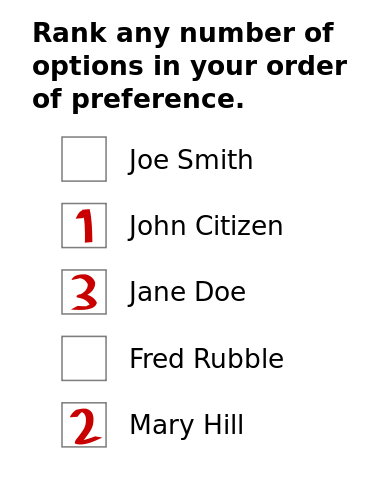
What we chiefly need is the ability to rank candidates, so that we can all actually choose the candidates we most want to win, instead of those we think have the greatest chance to win. That ability alone is the difference between our making a choice, and it being made for us.
CGP Grey has done an entire series of videos about the problems with FPTP and much better methods, so if you’d like to learn more, those videos are really the best place to start.
Do we really want to continue not having a functioning democracy?
Access to Health Care
A system of universal health care — the kind that basically everyone else in the world has adopted except us — would save us thousands of dollars per citizen. If designed like Switzerland, it could save us $832 billion. If designed like Germany: $1.2 trillion, Canada: $1.3 trillion, or like New Zealand or the UK: $1.7 trillion in savings — every year.
It’s safe to say that not having a system of truly universal health care, is akin to burning trillion dollar piles of money.
Do we really want to keep doing this?
Access to Education
A system of universal education — the kind that we originally pioneered and then let others surpass us with their own — would drastically reduce the amount we spend on educating ourselves, while drastically increasing the amount of people educated. College is now free in Germany as it is in other nations as well. Meanwhile, in the US, outstanding college loans now exceed $1.2 trillion.
How are people to prosper while saddled with school loan debts? How is the economy to thrive, with so much money spent repaying the loans we require to hopefully secure a job? What’s the point of spending the time and money to get a middle-wage job, if the amount taken to cover the loans is then equivalent to having a low-wage job? How is anyone to function as a consumer — the Alpha and the Omega of the economy — if their paychecks go only to basic needs and school loans and not to purchasing the goods and services of others?
It’s safe to say that also not having a system of truly universal education, is again akin to burning trillion dollar piles of money.
Do we really want to keep doing this as well?
Decriminalization
Simply reclassifying what constitutes crime would immediately reduce crime. We spend half as much money fighting drugs as we do buying them, and by just ending prohibition on drugs as we did on alcohol — a more dangerous drug — we could raise revenue and improve lives instead of wasting revenue and systematically destroying them.
We could stop spending about $40,000 per year on the 20% of our prison population of 2.2 million convicted of drug crimes, and instead raise over $70 billion in new revenue. We could save even more money by also avoiding the imprisonment of those convicted of many other non-violent crimes.
Doesn’t this make more sense too, to not fill up our prisons with non-violent offenders?
Patent and Copyright Reform
The granting of temporary protections for creative works was never meant to function as anything but a head start. They were certainly never meant to be permanent, which is what they effectively now are. By overprotecting and creating too many barriers, these systems no longer foster innovation, but effectively hamper it.
Because of this, some economists now believe it shouldn’t just be reformed, but abolished entirely:
“The historical and international evidence suggests that while weak patent systems may mildly increase innovation with limited side effects, strong patent systems retard innovation with many negative side effects…”
“Why use band-aids to staunch a major wound? Economists fought for decades — ultimately with considerable success — to reduce restrictions on international trade. A similar approach, albeit less slow, should be adopted to phase out patents.”
It can be argued that everything we do is actually a remix of something already known. By enriching the public domain instead of keeping ideas from it, we can accelerate the creation of new remixes that propel us all forward.
Intellectual property creates artificial scarcity. It is the opposite of creating abundance. Do we really wish to actively choose scarcity over abundance?
Homes for the Homeless
In Colorado it was estimated that the cost to the taxpayer for each homeless individual was $43,240. Just housing them instead costs $16,813. In Florida the cost of homelessness was estimated at $31,065 per taxpayer, while just housing them would cost $10,051. In Utah, the cost of homelessness was estimated at $16,670 per taxpayer, while just housing them would cost $11,000.
We know it saves more money to just provide homes, than to let people be homeless.
However, we also know that “cash payments increase the welfare of recipients to a greater degree than do transfers-in-kind of equal cash value.” And it is this knowledge, that leads us to possibly the single most effective change of all, affecting the greatest number of our wasteful and counterproductive expenditures.
We can just start giving everyone money.
This is how we can stop fiddling with our transmission and instead improve our entire engine — Universal Basic Income.
The Improved Engine of the United States
- A basic income would reduce the need for health care. A program tested in Canada reduced the need for health care by close to 10%.
- A basic income would reduce crime rates. A program tested in Namibia reduced all crime by over 40%, and the most extreme crimes by as much as 95%.
- A basic income would directly reduce income inequality.
- A basic income could reduce the demand for higher education that is now effectively required, while also increasing the ability of those who wish to pursue their educations to do so. Basic income experiments reflect this.
- A basic income could eliminate the bureaucracy of our welfare and pension programs by nullifying the need for them.
- A basic income could eliminate the waste of people doing nothing at work by allowing them to reduce their hours and to quit “bullshit jobs”.
- A basic income could reduce the waste of the military functioning effectively as a jobs program by ending the need for jobs to live.
- A basic income could reduce the waste of work presenteeism and overwork, and make it so that people don’t feel forced to go to the office when they should stay home or feel forced to work more than is optimal.
- A basic income could help reduce the waste of unpurchased food by allowing more people to purchase it.
- A basic income could reduce the waste of unused vacation days by allowing people to actually take them.
- A basic income would allow for the elimination of mostly invisible subsidies and deductions that presently help mostly the few, replacing them instead with visible cash that helps everyone.
- A basic income could decrease the economic losses of commuting by better allowing people to live closer to their jobs or further away from expensive areas where jobs are centralized.
- A basic income could reduce the invisible tax on the poor that is lottery tickets and other forms of gambling by their no longer representing the only perceived way of getting ahead.
- A basic income could better enable the transition from coal to green energies. Much of coal production exists because there are no other jobs to be found.
- A basic income would reduce the epidemic of suicide by increasing mental health through the reduction of stress and increases in security.
- A basic income would increase productivity by allowing those who hate their jobs to quit and those who want those jobs to take them instead of remaining unemployed. Fully voluntary work increases commitment.
- A basic income would shift work towards intrinsic motivation by allowing people to pursue the work they intrinsically wish to pursue. This increases productivity and raises wages.
- A basic income could create a more engaged and active citizenry by increasing every citizen’s autonomy and ability to participate as citizens.
- A basic income could replace the role unions once played, by granting everyone sufficient bargaining power at the individual level thanks to the ability to say “No.”
- A basic income would reduce all the costs of hunger. It would eliminate poverty entirely, and every one of its costs right along with it. This has already been scientifically tested and long known.
- A basic income would transform all income earned from work into discretionary income. With everyone’s basic needs covered, everyone could power the economy as a consumer. This means a stronger, wider, more decentralized, and more stable people-powered economy.
A basic income guarantee is how we can spend more on our engine to spend less on our transmission.
How much more?
Why not start at just above the poverty line with a monthly income of $1,000 for adult citizens and $300 for youth citizens? This would cost an estimated $3 trillion, but the total savings it stands to introduce in reducing the more than $10 trillion we already spend, along with the social and economic growth fostered as a result, are almost incalculable in value.
The Engine Improvement That Pays for Itself
Canada did a study to determine how much money could be saved on adults by spending just $1 on them when they’re young. They concluded $1 would save $3 to $9.
What does this mean for basic income?
It means that tomorrow if we started just providing $300 a month as a youth citizen allowance, we would not have to spend $900 to $2,700 a month on everyone as adults as the costs of crime and medical care.
This also means that when kids became adults, a basic income as high as $2,700 per month would cost not a penny more than we already spend, but without all the crime and poor health. So why not start a universal allowance for our children immediately, and consider their basic incomes as adults entirely paid in full?
No more poverty. Less crime. Better health. Higher productivity. Accelerated economy. Expanded democracy. More happiness. Even greater intelligence. These are measures of a functioning system working for everyone. This is the systemic production of fewer red beads.
It’s also just what the doctor prescribes…
The Return of the American Dream
The United States of America used to dream. We used to aspire for greatness. We pushed the envelope of what was possible. When did we lose that?
When did the status quo become more important than what could be? When did playing it safe triumph over proving the naysayers wrong?
It doesn’t have to be this way. We can push for greatness again. We can do the “impossible” and show the world what can be done when a nation of mutually empowered individuals recognizes not only our independence but our interdependence.
America was not built on the idea of every man for himself. It was built on a higher ideal. It was built on our common security and common purpose. It was built on the idea that a government should serve its people — not some of its people — all of its people.
“We the People of the United States, in Order to form a more perfect Union, establish Justice, insure domestic Tranquility, provide for the common defense, promote the general Welfare, and secure the Blessings of Liberty to ourselves and our Posterity, do ordain and establish this Constitution for the United States of America.”
Hallowed words, right? One of these words, we can’t even use any more today without a stigma attached, and yet the word “welfare” is in the preamble. This was a primary point of the entire document, to create a system of government that assured we were all better off together than as individuals; that by working together, we could secure our liberty. We could achieve so much more than we ever could as individuals, and we could do this not only for us, but for each and every succeeding generation.
“I must study politics and war, that my sons may have the liberty to study mathematics and philosophy, geography, natural history, and naval architecture, navigation, commerce, and agriculture, in order to give their children a right to study painting, poetry, music, architecture, statuary, tapestry and porcelain.” — John Adams, Founding Father and 2nd President of the United States
We had an aim. Long-term thinking was built into the national contract. The intent was to build a system that would always improve, and the very basis of this system was the guarantee of our general security. Every generation was to be better off than the last, and with each generation, more would be free to pursue that which they most wished to pursue, because each generation would be more secure than the last.
The year is now 2015. How secure do you feel in this day and age?
We have lost our way.
We have become a nation of got-mines where once we strove for union. We have become a nation seeking war over tranquility, injustice over justice, tax cuts over welfare, lack of opportunity over liberty, and short-term profits over long-term posterity.
If we are to rediscover our way as a nation, systemic thinking is required and an aim must be set.
My suggestion for our new aim is the same as that of W. Edwards Deming:
Everybody wins. Nobody loses.
I submit that if we are to achieve this aim, we should manage our society as a system, and this system should always improve. We should use all our tools and knowledge to make constant improvements. We should not let our individual ideologies hinder us from this goal, and we should put greater importance on what science reveals to us as potential ways forward.
Where science points the way forward, we should step.
This nation was not built for the pursuit of money. It was built for the pursuit of greatness.
How do we measure greatness? Is it GDP? Or is it something else? Robert F. Kennedy thought it might be something else.
Kennedy was not alone and others continue to join the chorus for an economic ruler other than GDP. If we begin to use another ruler, we may learn something new about ourselves and how we compare to others.
In the case of the “Good Country Index”, we’re not in the top 10. We’re 21st.
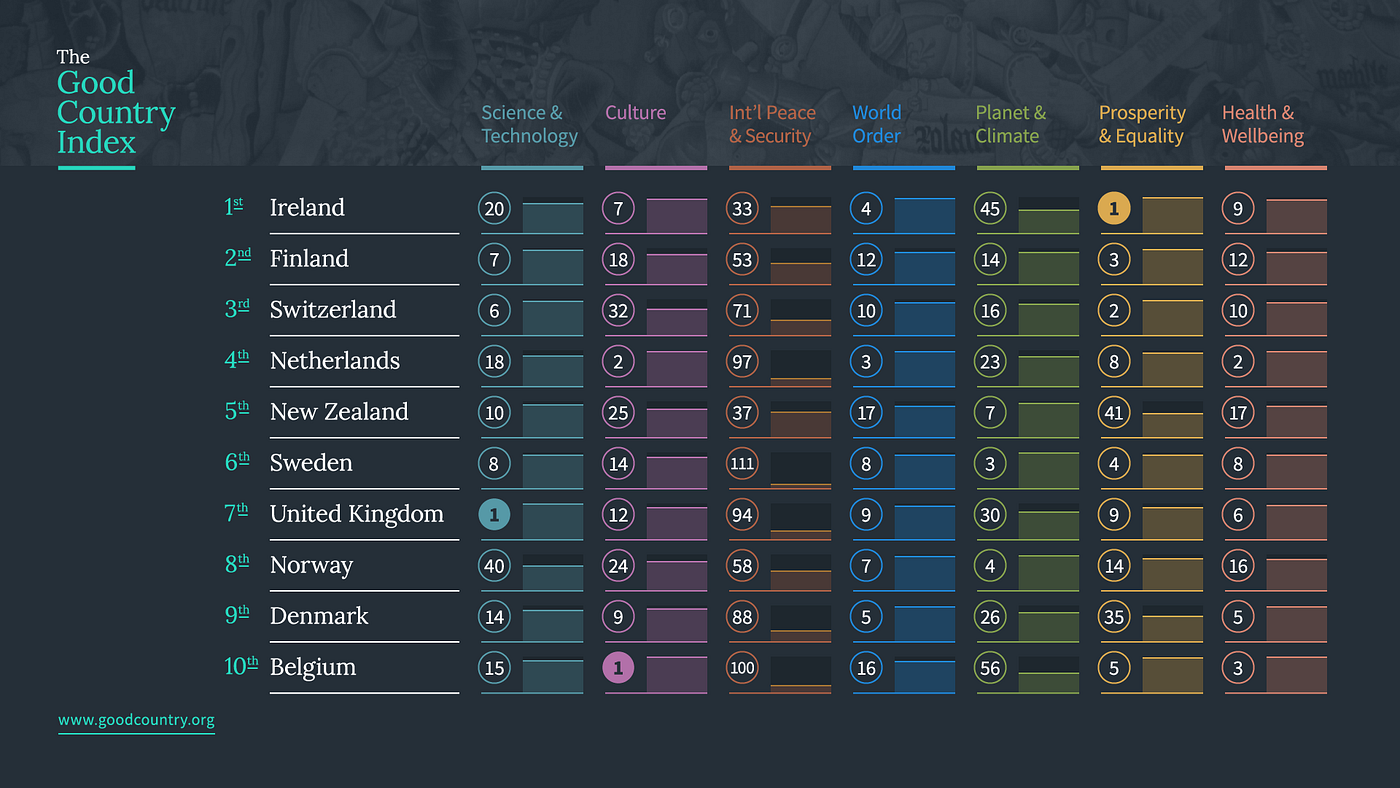
If instead we measured happiness, in 2013 we ranked 17th.

Are these the kinds of lists we want to strive to top instead of GDP? Do we only want to be measured as creating the most wealth of all developed countries, or do we also want to be measured as doing the most good or being the most happy?
Are we even the most developed country?
“With the storehouse of skills and knowledge contained in the millions of unemployed, and with the even more appalling underuse, misuse, and abuse of skills and knowledge in the army of employed people in all ranks in all industries, the United States may be today the most underdeveloped country in the world.” — Dr. W. Edwards Deming, Out of Crisis, 1982
Focusing on our untapped potential, W. Edwards Deming considered the United States to be possibly the most underdeveloped country in the world.
But we can change that.

Did you enjoy reading this? Please click the subscribe button and also consider making a monthly pledge in support of my daily advocacy of basic income for all.
_large.jpg)
UBI Guide Newsletter
Join the newsletter to receive the latest updates in your inbox.



